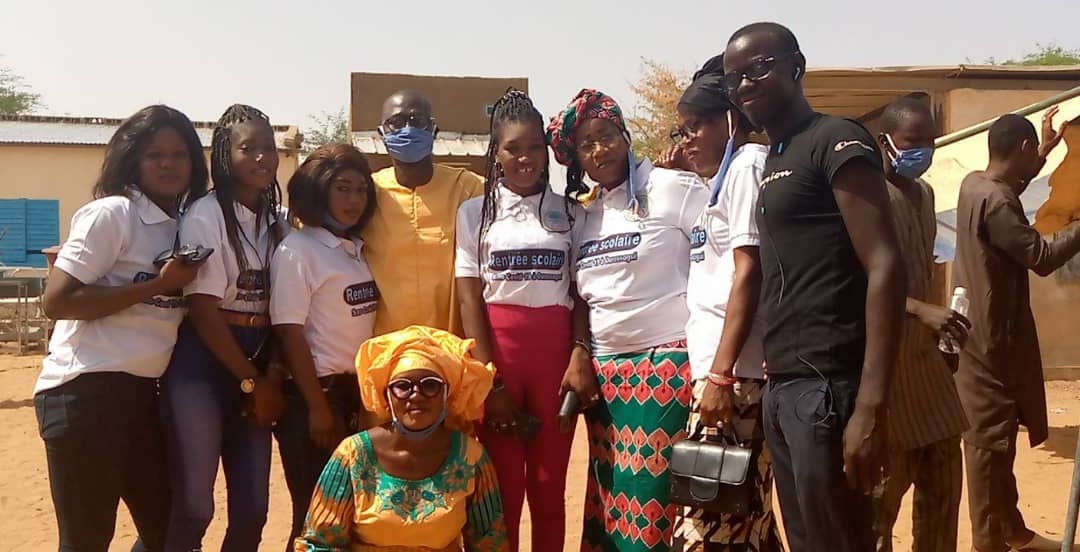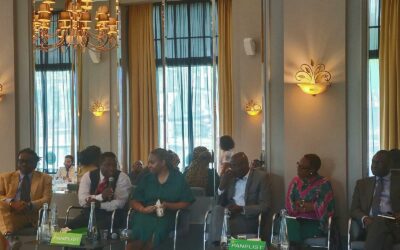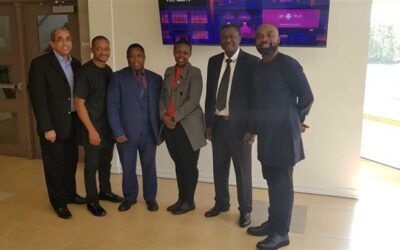Structural unemployment in Senegal is very high. Faced with the scale of the phenomenon, the Senegalese government is putting in place major projects and substantial funding. The country has created vocational training structures and is committed to investing 450 billion CFA francs in education by 2024. The organisation Pencum Leona-HLM is trying to do its part by acting locally with the help of RAP2D. Their main objective is to train future restaurant owners, hairdressers and dressmakers in communication and business management. This project was formed in response to a global problem in Senegal: the inactivity of young people.
Meeting with the presidents of these two organisations : Pape Moussa Sall (Pencum) and Mr Mouhadji Diankha (RAP2D).
– Training for independence
Private and public companies are not able to absorb all the young people of working age in Senegal. For Pape Moussa, a change of paradigm is needed and they need to be trained in entrepreneurship: “If you don’t know how to create a company, you will think that working as a salaried employee is the only prospect for you and you will be very disappointed by the lack of opportunities. But to start without preparation is too risky. Through training, they have to understand that they are independent and that entrepreneurship is a form of self-building.”
– Socio-professional integration of women
In Saint-Louis, the unemployment rate for young women is higher than that of young men. The rate doubles : 17.4% for women against 9.1% for men. However, these women may be working in informal settings. This training can help them to be more aware of their rights and legal obligations. As Pape Moussa explains: ‘We give them tools and teach them to formalise themselves with information on the consular chamber or the chamber of trades. We teach them to formalise and to be recognised.
Mouhadji Diankha of RAP2D explains that early marriage of young women can also explain these figures. “The gender issue is fully part of the project. We want to empower young women who are often married at a very young age. Parents are also targets to be sensitised.
Today, the centre trains mainly young girls. As Pape Moussa Sall points out: “In our project, 80 to 90% are women. We train a lot of women because until now, in Senegal, certain jobs are considered to be more feminine. Especially in the three sectors where we concentrate our activities: catering, sewing and hairdressing. But it must be admitted that certain socio-cultural habits may play a role in the fact that we train more women. In the cities, you will see many more dressmakers than seamstresses. Nevertheless, you will see more women than men training in an organised structure. Boys prefer to learn on the job rather than go to a centre.
– Training for self-promotion through social networks
Digital opportunities were taken into account in the creation of this training. In addition to the business management part, some courses train young people in communication. Consumer habits have changed a lot with this crisis. “The covid19 crisis has amplified the importance of these digital tools. It was not very difficult to convince these young people to use these communication channels as real business tools. Today, they have seen what is happening with online commerce. Some see other freelancers selling through Whatsapp. With this training, we show that they can sell themselves and make themselves much more visible through social networks. They need to understand that all these social networks can be used for more than just entertainment.” Pape Moussa Sall.
– About the partner organisations
The Réseau d’Accompagnement des projets de Développement Durable (RAP2D, Mantes-La-Jolie -France) decided to support the Pencum Leona-HLM learning centre, based in Saint-Louis, Senegal in the creation of an entrepreneurship training course. The two associations have based themselves on the three pillars of sustainable development (a social, economic and ecological pillar) to co-construct this project. As Mouhadji Diankha explains: “This evolution is very palpable in the projects we support. You can’t talk about one without the other. Projects must be ecologically sustainable, socially just and economically viable.
Through its own experience in project management, RAP2D will be able to provide great support in this new project. “In the framework of the MODAL project, there is a transfer of technical skills linked to our experience. I wanted Pencum to benefit from our skills.”, said Mouhadji.




